News

VfB Stuttgart through to DFB-Pokal final after 3-1 win against RB Leipzig
VfB Stuttgart have reached the final of the DFB-Pokal for the seventh time in their history after a 3-1 win against RB Leipzig in the semi-finals.

Bielefeld knock out defending champions Leverkusen to advance to DFB-Pokal final
Arminia Bielefeld shocked defending champions Bayer 04 Leverkusen to reach the DFB-Pokal final for the first time in the club’s history after a 2-1 win.

Almuth Schult announces decision to end career
Almuth Schmidt announced today that she will end her career in professional football. The goalkeeper is not only retiring from the Germany national team but also at club level. The 34-year-old racked up a total of 66 Germany caps.
.jpg%3F1742934172)
Woltemade hat-trick secures 3-1 win against Spain U21s
Germany U21s ran out 3-1 winners against Spain U21s in Darmstadt, courtesy of a hat-trick from Nick Woltemade.

Head coach Wück hands Franziska Kett first call-up
National team head coach Christian Wück has announced his 23-player squad for the upcoming UEFA Women's Nations League fixtures with Scotland. 20-year-old Franziska Kett of FC Bayern München has received her first Germany call-up.

Germany to play Slovakia, Northern Ireland and Luxembourg in their World Cup qualification group
Germany now know their opponents for their World Cup qualification campaign. Julian Nagelsmann’s team will be in group A along with Slovakia, Northern Ireland and Luxembourg.

Nagelsmann: “The first half was very impressive, unbelievably good”
Germany are into the final tournament on home soil! The national team reached the semi-finals of the Nations League after a 3-3 draw with Italy in their quarter-final second leg. DFB.de has all the reaction from the match.

Germany into Nations League semi-finals after draw in Dortmund
Germany have reached the semi-finals of the UEFA Nations League for the first time. Following their first-leg victory in Milan, Germany drew 3-3 with Italy in the second leg in Dortmund, setting up a meeting with Portugal in Munich on 4th June.
Unsere Partner

Nagelsmann: "Possession will play a key role"
The Germany national team take to the pitch once again on Sunday evening as they face Italy in the second leg of their Nations League quarter-final tie. Head coach Julian Nagelsmann and goalkeeper Oliver Baumann spoke about expectations for the game.

U21s record 1-0 win in Slovakia
The Germany U21 national team ran out 1-0 winners in their friendly match away to Slovakia in Trvana. Head coach Antonio di Salvo witnessed his team produce a solid performance as they look to gain momentum ahead of the upcoming U21 EUROs.

Nagelsmann: “The team gave everything to win the game”
Head coach Julian Nagelsmann and his players were pleased with Germany’s away win in the first leg of their UEFA Nations League quarter-final with Italy. DFB.de has all the reaction from their 2-1 win in Milan.

Goretzka and Kleindienst earn Germany away win in Italy
Germany put themselves in a strong position to progress to the semi-finals of the UEFA Nations League as head coach Julian Nagelsmann’s side came from behind to win 2-1 in the first leg against Italy at the San Siro in Milan.

Rüdiger: "It's a massive game"
Head coach Julian Nagelsmann and centre-back Antonio Rüdiger spoke to the press ahead of the first leg of their UEFA Nations League quarter-final against Italy.
.jpg%3F1742374049)
Magull announces international retirement
Lina Magull has announced her retirement from international football. The 30-year-old earned 77 caps for the Germany women's national team, scoring 22 goals in the process.

Adidas release special kit to celebrate 125 years of the DFB
In collaboration with partner adidas, the DFB have released a special limited edition kit to celebrate the 125th anniversary of the association’s founding. The shirt symbolises the emotion invoked by the special moments experienced over this period.

Two debutants named in Germany U21 squad
Head coach Antonio Di Salvo has announced his squad for the team’s first games of 2025, which will also serve as preparation for this summer's U21 EUROs.

DFB announce venues for home World Cup qualifiers
The DFB GmbH & Co. KG Supervisory Board and Shareholders’ Assembly decided on the venues for the Germany national team’s home World Cup qualifying fixtures in their meeting on Friday in Frankfurt am Main.

Di Salvo to remain Germany U21 head coach
The DFB have extended the contract of Germany U21 head coach Antonio Di Salvo by a further two years until 31st July 2027. The 45-year-old will therefore remain in charge beyond this year’s European Championship tournament in Slovakia.

Bisseck receives maiden call-up for Nations League quarter-final with Italy
On Thursday, Germany national team head coach Julian Nagelsmann named his 23-man squad for the upcoming UEFA Nations League quarter-final against Italy, with one debutant and eight returning players.
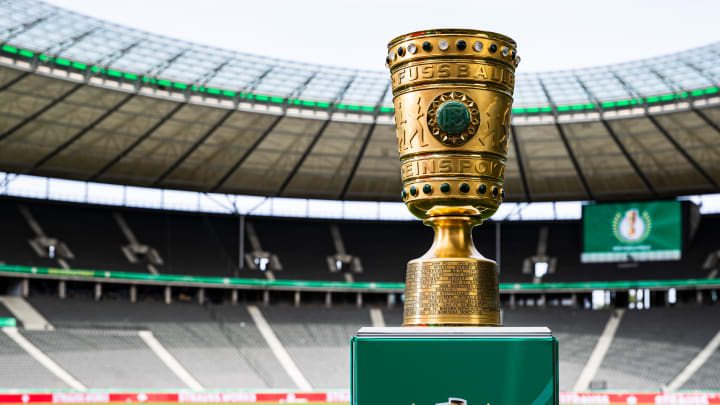
Third-tier Bielefeld welcome Leverkusen and Stuttgart host Leipzig
Holders Bayer 04 Leverkusen will travel to third-tier side Arminia Bielefeld in the semi-finals of the DFB-Pokal. VfB Stuttgart meanwhile will host fellow Bundesliga club RB Leipzig.
.jpg%3F1740605842)
RB Leipzig complete semi-final line-up thanks to Šeško penalty
RB Leipzig have taken another step towards their fourth DFB-Pokal final in the past five years. The Saxons edged out Bundesliga rivals VfL Wolfsburg 1-0 in the quarter-finals on Wednesday night, completing the line-up for the final four.
.jpg%3F1740516664)
Bielefeld stun Werder to advance to cup semi-finals
Arminia Bielefeld have progressed to the semi-finals of the DFB-Pokal following a 2-1 win against SV Werder Bremen.
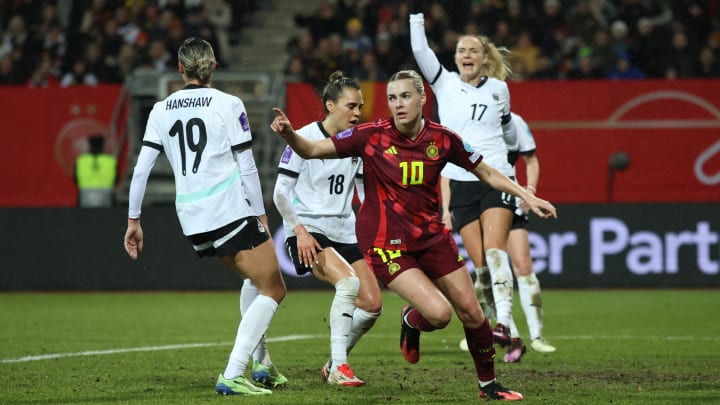
Germany women victorious after 4-1 triumph against Austria
Germany’s women’s national team celebrated a 4-1 win against Austria in the UEFA Nations League on Tuesday evening. It was their first home win under head coach Christian Wück, in front of 14,394 spectators in Nuremberg.
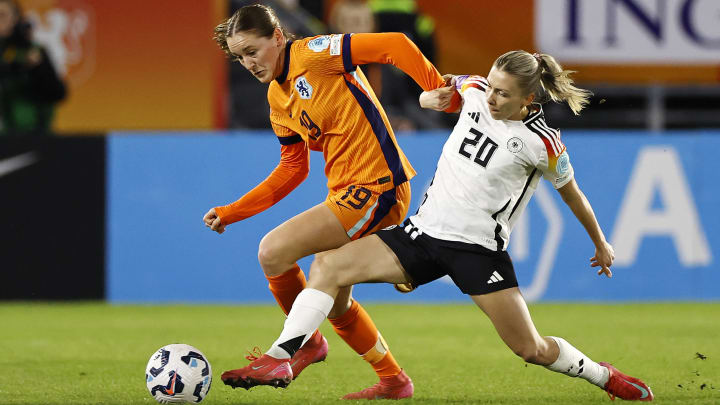
Nations League campaign kicks off with draw in the Netherlands
The Germany Women’s national team began the new Nations League campaign with a 2-2 draw away to the Netherlands in Breda. Schüller and Nüsken netted for Christian Wück’s team, with Lineth Beerensteyn bagging a brace for the hosts.
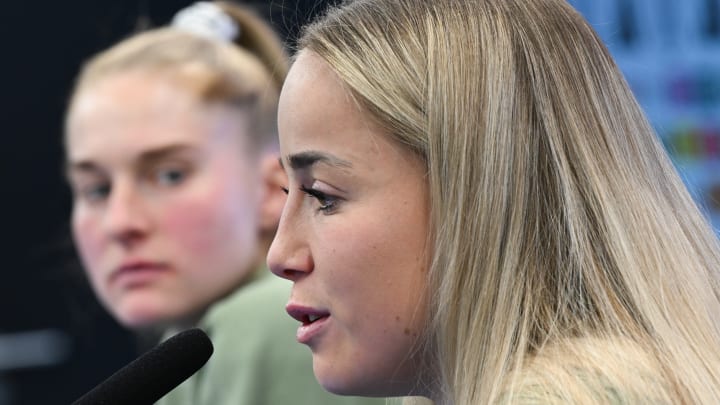
Gwinn: “I want to get even more out of the players”
Giulia Gwinn has been named as the new captain of the Germany women’s national team. The 25-year-old and her new vice-captain, Janina Minge, spoke about their appointment, team chemistry and the upcoming Nations League games.
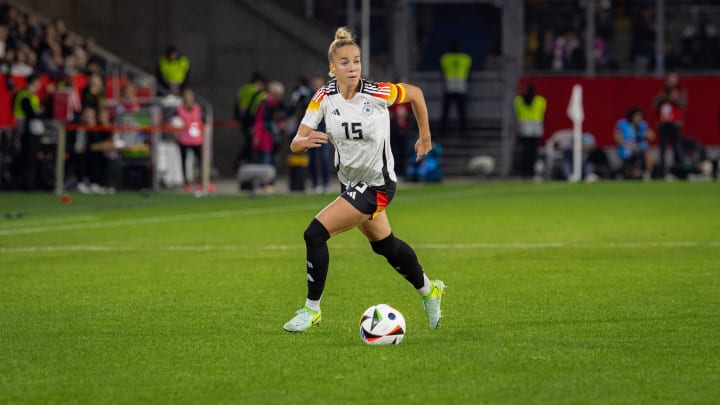
Gwinn named new Germany Women’s captain
Giulia Gwinn (25) has been named as the new captain of the Germany Women’s national team, as announced by Christian Wück on Tuesday morning. The FC Bayern full-back takes over from Alexandra Popp, who retired from international football last year.

adidas release new Germany women’s away shirt
Together with partner adidas, Germany have unveiled the new women's away shirt ahead of the UEFA Women’s EURO 2025.
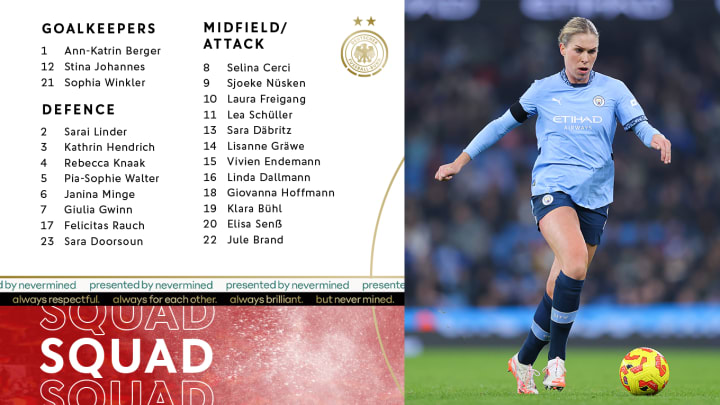
National team head coach Christian Wück calls up Rebecca Knaak
National team head coach Christian Wück has announced his 23-player squad for Germany’s two upcoming UEFA Women’s Nations League matches against the Netherlands and Austria.
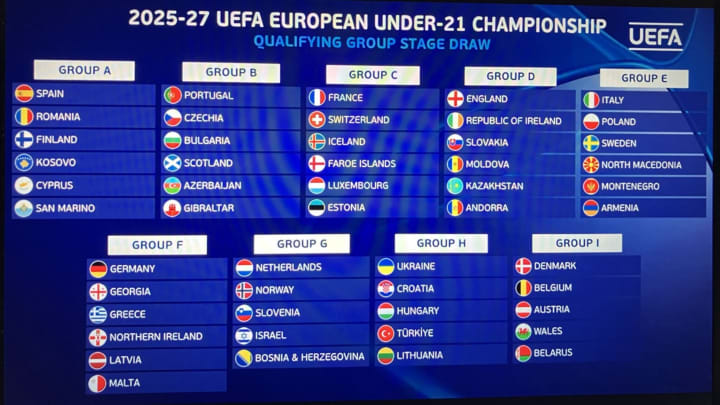
Germany U21s’ EURO 2027 qualifying group drawn
The Germany U21 national team have been drawn into qualification Group F for the 2027 European Championship in Albania and Serbia, along with Georgia, Greece, Northern Ireland, Latvia and Malta.

Derby drama in the quarter-final as Leverkusen knock Köln out
Bayer 04 Leverkusen’s defence of their DFB-Pokal crown goes on as they dispatched of Köln in an eventful derby. The double winning team of last season turned around a 2-0 deficit in the quarter-final against their second-tier opposition.
.jpg%3F1738739900)
Undav sends Stuttgart into the semi-finals
VfB Stuttgart are the first team through to the semi-finals of the 2024/25 DFB-Pokal. The Swabians narrowly beat fellow Bundesliga side FC Augsburg 1-0 on Tuesday night to secure a place in the final four for the twelfth time.
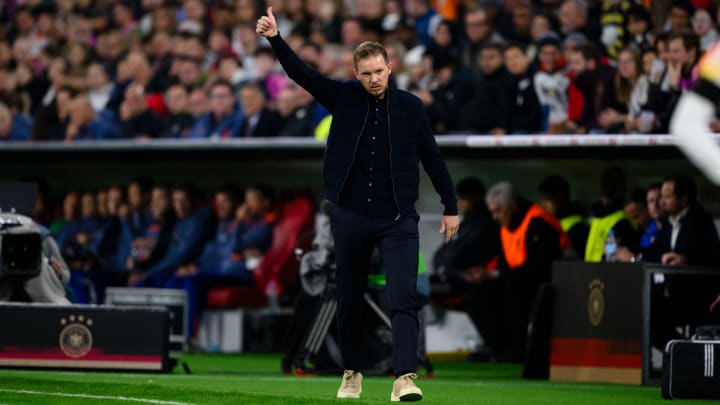
Nagelsmann extends contract as Germany head coach until EURO 2028
Julian Nagelsmann will continue as head coach of the Germany men’s senior national team beyond the upcoming World Cup. The 37-year-old put pen to paper on a new contract running until 2028 in Leipzig on Friday.

Britta Carlson leaves her role at the DFB
Britta Carlson has left her role as assistant coach of the Germany Women’s national team, mutually agreeing to dissolve her contract with the DFB in order to take up a position as head coach of the 1. FC Köln women’s team in the Frauen-Bundesliga.
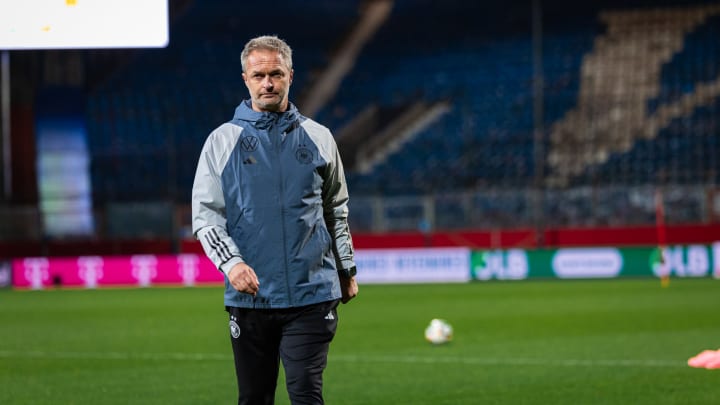
Wück: “Gain confidence by winning games”
Christian Wück has been coach of Germany’s women’s team since the start of August. At the end of 2024, the 51-year-old spoke to DFB.de about his first few months in charge, his goals and next year’s European Championship in Switzerland.
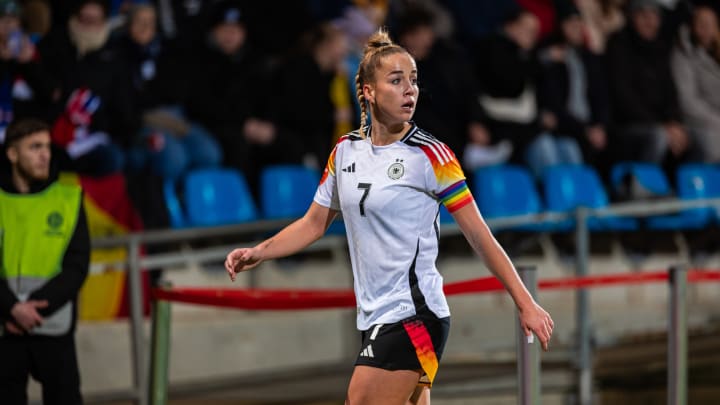
Giulia Gwinn: “Moments we’ll never forget”
The fans voted for Giulia Gwinn as the Germany Women’s Player of the Year for 2024. The FC Bayern defender spoke to DFB.de about the last 12 months.
.jpg%3F1734371659)
Germany to face Denmark, Sweden and Poland at 2025 Women's EUROs
The Germany women's national team will come up against Denmark, Sweden and Poland in Group C at the 2025 Women's EUROs in Switzerland next summer.

Rhine derby in quarter-finals: Leverkusen to take on Köln
Germany handball player Julian Köster conducted the draw for this season’s DFB-Pokal clashes at the German Football Museum in Dortmund. Alongside DFB vice-president Peter Frymuth, the Olympic silver medallist drew four mouth-watering clashes.

Germany’s World Cup qualifying paths outlined
The Germany national team know their two possible paths for the European Qualifiers for the 2026 FIFA World Cup following Friday’s draw in Zurich, with the opponents depending on their UEFA Nations League quarter-final result against Italy.
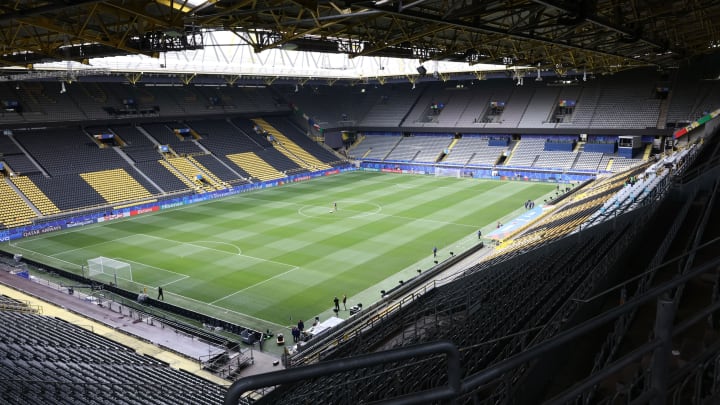
UEFA Nations League quarter-final against Italy to take place in Dortmund
The Germany national team will play the second leg of their UEFA Nations League quarter-final against Italy on 23rd March 2025 in Dortmund. The decision was made by the supervisory board and shareholders’ collective of DFB GmbH & Co. KG.
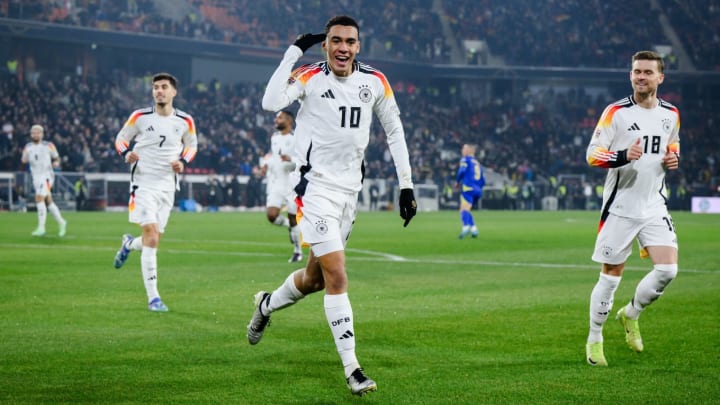
Jamal Musiala named Germany Men’s Player of the Year for 2024
With an impressive 56% of the vote, attacker Jamal Musiala has been named as Germany’s Player of the Year for 2024 by the fans.
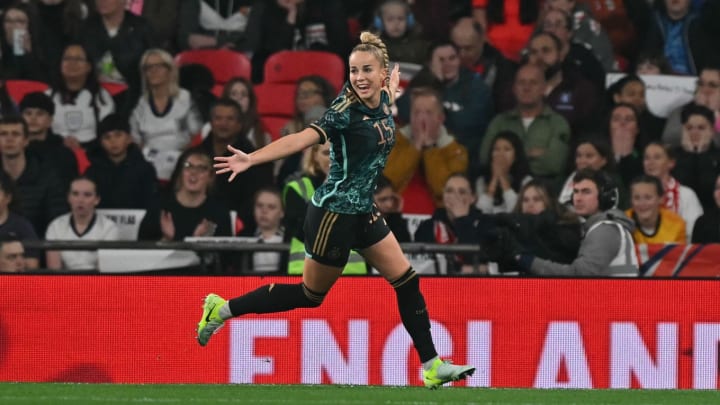
Giulia Gwinn is the Germany Women’s Player of the Year
The fans have spoken! Giulia Gwinn has been named the Germany Women’s Player of the Year 2024. It’s the first time that the 25-year-old FC Bayern player has taken the accolade, claiming a commanding 59 percent of the vote.
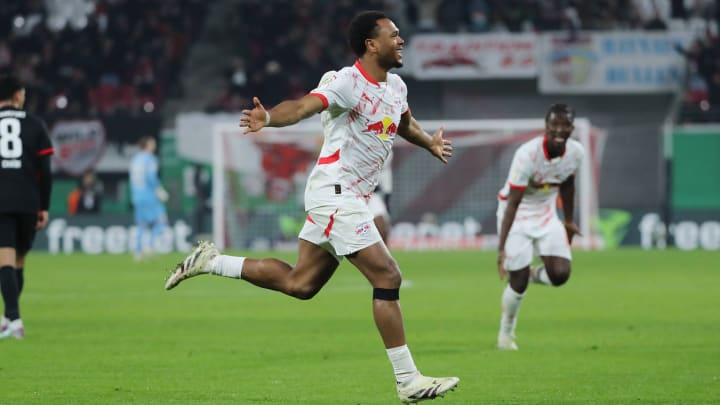
Openda fires Leipzig into the quarter-finals
RB Leipzig convincingly booked their place in the DFB-Pokal quarter-finals with a dominant 3-0 victory over Eintracht Frankfurt. FC Augsburg also secured a spot in the last eight, defeating 2. Bundesliga side Karlsruher SC 5-4 on penalties.
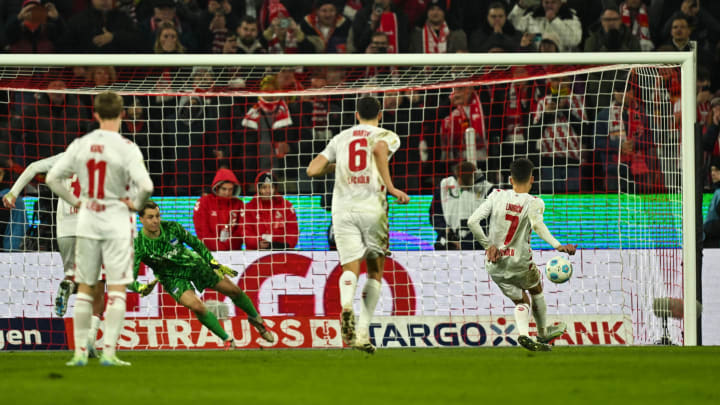
Cologne need extra time to see off 10-man Hertha
VfL Wolfsburg are through to the quarter-finals of the DFB-Pokal after a commanding 3-0 victory over TSG Hoffenheim. Elsewhere, 1. FC Köln needed extra time to see off fellow 2. Bundesliga side Hertha BSC.

Leverkusen win 1-0 in Munich to reach quarterfinals
Defending DFB-Pokal champions Bayer Leverkusen won 1-0 against Bayern München, who were down to ten men after Manuel Neuer was sent off, to progress through to the quarterfinals thanks to Nathan Tella's deciding goal.
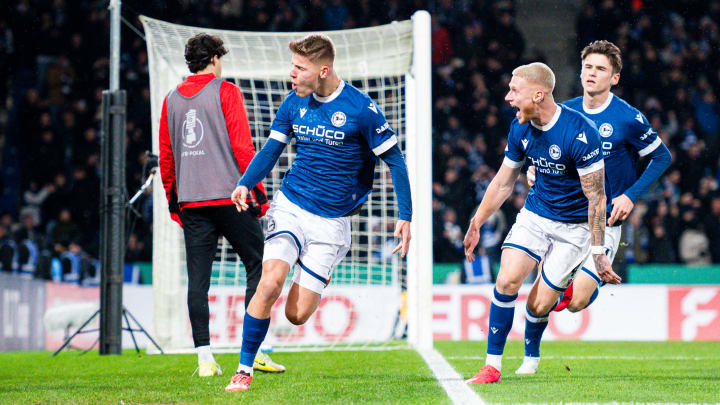
Bielefeld stun Freiburg to advance
Arminia Bielefeld and VfB Stuttgart became the first two sides to advance to the quarterfinals of the DFB-Pokal on Tuesday evening.
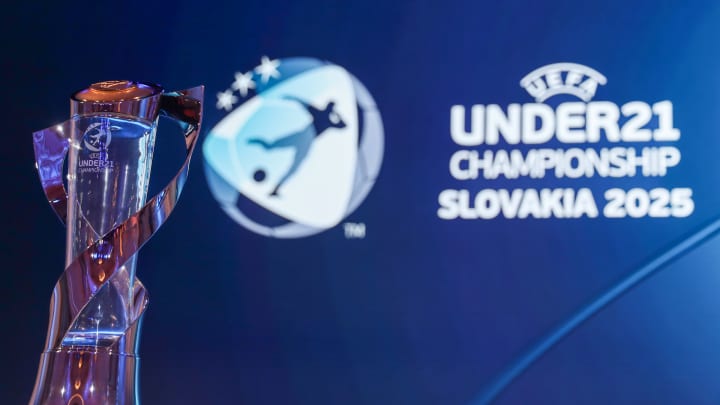
U21s to face Czechia, England and Slovenia in group stage of U21 EUROs
The group stage draw ahead of next summer's U21 EUROS in Slovakia was conducted in the nation's capital, Bratislava, on Tuesday evening. The Germany U21s will come up against Czechia, England and Slovenia in Group B.
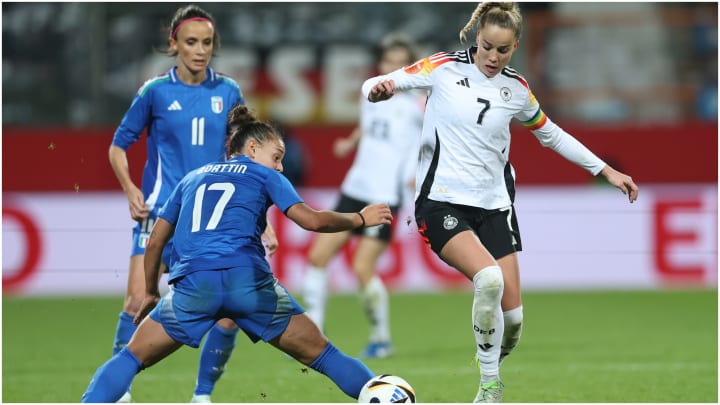
Germany lose 2-1 to Italy in their final home match of the year
The Germany Women’s national team lost their final fixture of the calendar year as they were defeated 2-1 by Italy in Bochum. Felicitas Rauch netted for Germany (51’), while Agnese Bonfantini (11’) and Sofia Cantore scored the goals for Italy.
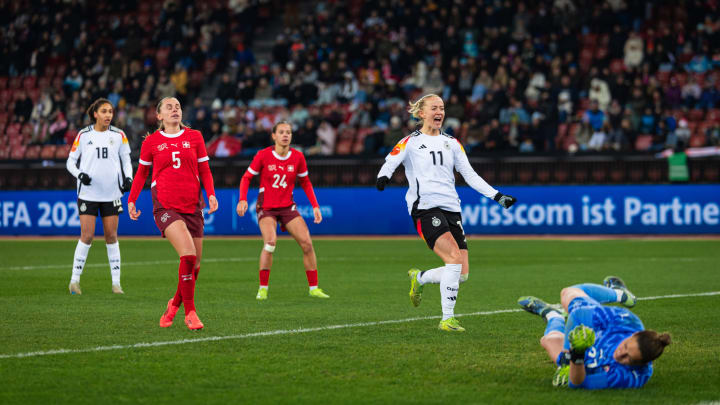
Freigang and Schüller net twice in 6-0 win over Switzerland
The Germany women's national team won 6-0 against Switzerland in Zurich, in their final away game of the year. Nüsken, Freigang, Schüller and Zicai all got on the scoresheet for head coach Christian Wück's side.
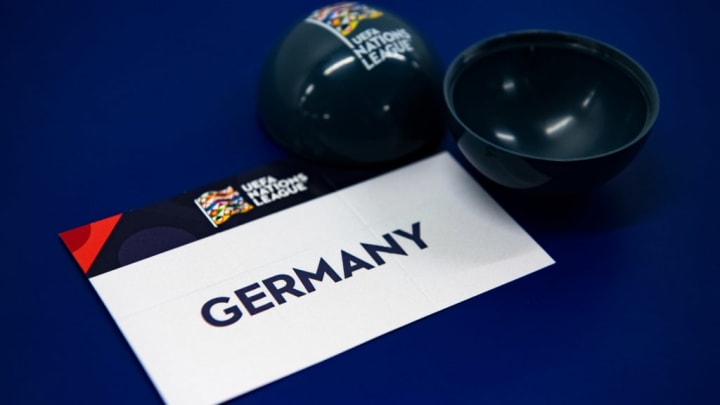
Germany drawn against Italy for Nations League quarter-final
The Germany national team have been drawn against Italy for the quarter-final stage of the UEFA Nations League. Should Julian Nagelsmann’s side claim victory, they would then progress to a semi-final clash against either Denmark or Portugal.

Andrich: "2024 was a good year for us"
DFB.de has all the match reaction after the Germany national team recorded a draw in their final international fixture of the calendar year 2024. Julian Nagelsmann’s side drew 1-1 with Hungary, as Felix Nmecha scored his first international goal.
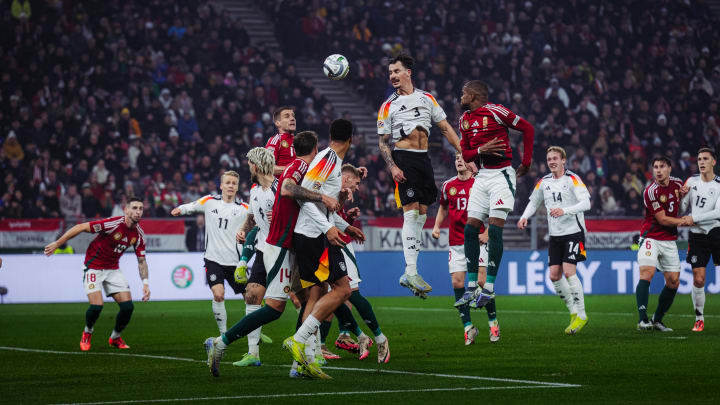
Germany denied victory by last minute penalty
The Germany national team secured their unbeaten status in the group stage of the UEFA Nations League. In Budapest, national head coach Julian Nagelsmann’s side drew 1-1 with hosts Hungary, while Felix Nmecha netted his first international goal.
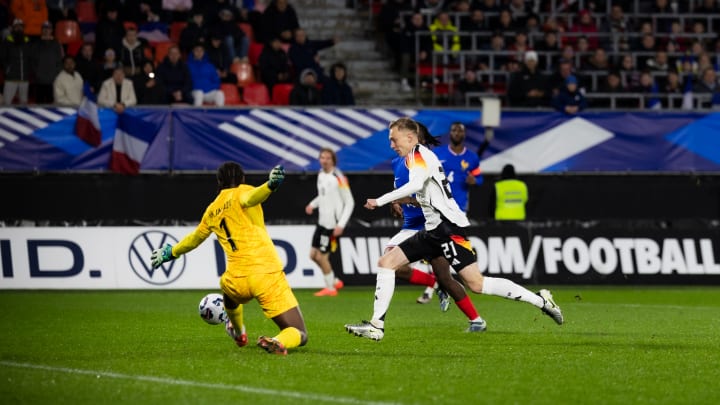
Beier scores brace in France draw
After taking a 2-0 lead through a Maximilian Beier double, France U21s hit back with two goals, including one in added time, to deny Antonio Di Salvo's side victory. That said, Germany U21s remained undefeated in their final game of 2024.
.png%3F1732020823)
Wück calls up Zicai and Şehitler for the first time
Germany women's head coach Christian Wück has announced his squad for the final two internationals of the year. Included for the first time in his 23-player squad are 19-year-old Cora Zicai (SC Freiburg) and 17-year-old Alara Şehitler (FC Bayern Münc
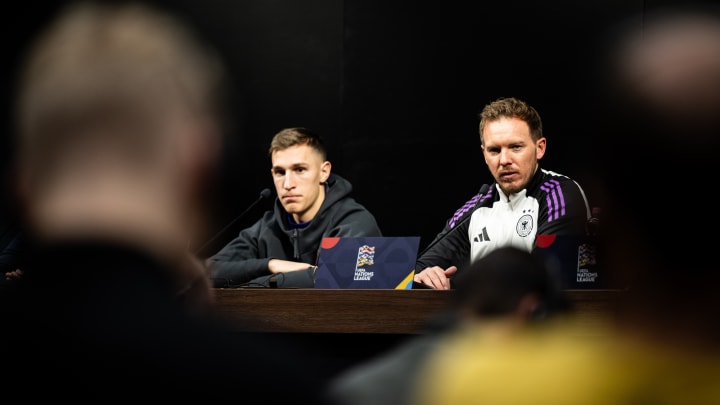
Nagelsmann set to make “several changes” for Hungary
Germany play their final Nations League group game on Tuesday night (20:45 CET) against Hungary in Budapest.
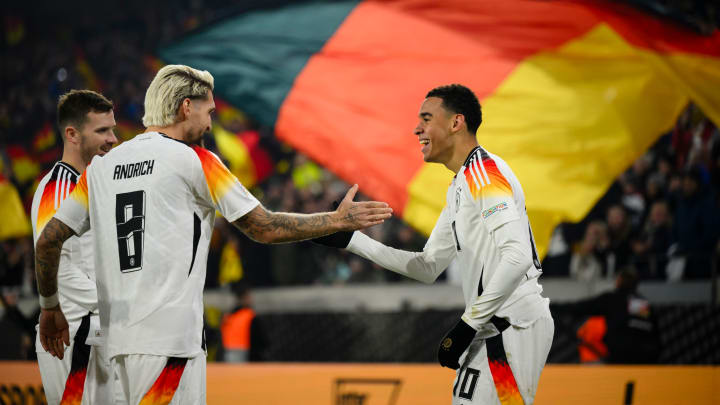
Germany secure top spot with flurry of goals
Having already secured their passage into the Nations League quarter-finals, the Germany national team made sure of top spot in Group 3 by defeating Bosnia and Herzegovina 7-0 in Freiburg.
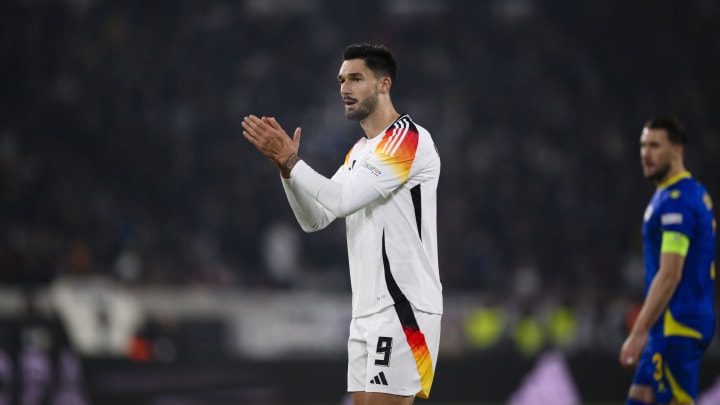
Kleindienst: “A dream come true”
Germany’s resounding 7-0 win over Bosnia and Herzegovina in Freiburg on Saturday night ensured they won their Nations League group. DFB.de has collected the post-match reaction.
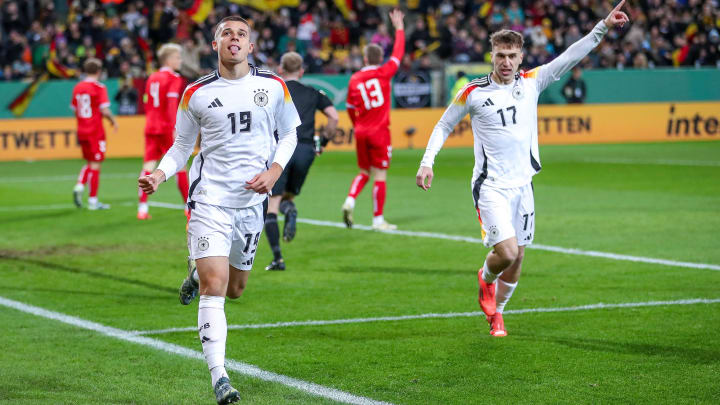
Germany U21s win 3-0 against Denmark
Germany U21s celebrated a 3-0 win in a friendly against Denmark U21s in Aachen. Tresoldi, Brown and Moukoko scored for Antonio Di Salvo's side.

Kimmich: "The Austria game was a definite low point"
Ahead of the Nations League double-header against Bosnia and Herzegovina Hungary, FC Bayern München midfielder and new Germany national team captain Joshua Kimmich spoke to DFB.de regarding the development of the squad.

Stiller pulls out of Germany squad
Angelo Stiller will miss Germany’s upcoming internationals against Bosnia and Herzegovina on Saturday (20:45 CET in Freiburg) and Hungary next Tuesday (20:45 CET in Budapest) due to muscular problems.
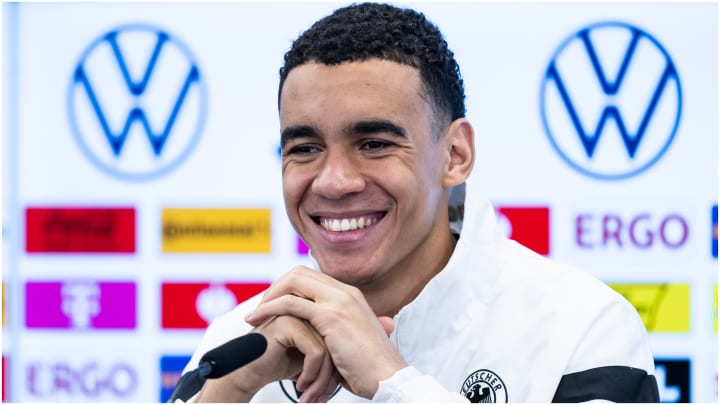
Musiala: "Win games and keep making advances"
Jamal Musiala continues to become ever more crucial to FC Bayern München and wants to carry on his good recent form at international level in Germany’s final two group games of the current Nations League campaign.
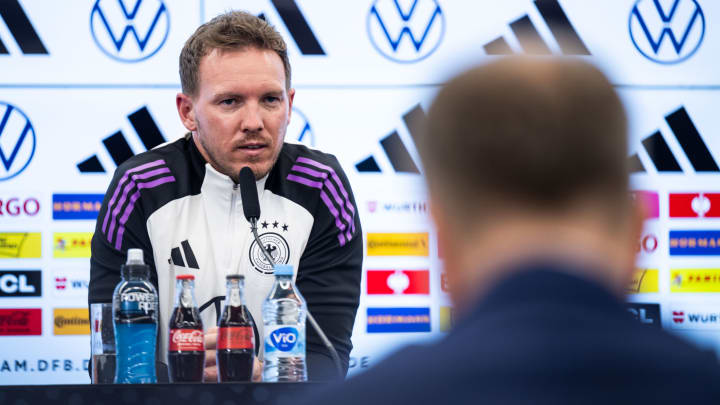
Nagelsmann: "Preserve the excitement the fans feel towards the players"
Head coach Julian Nagelsmann spoke during a press conference about the final two Nations League matches against Bosnia and Herzgovina on Saturday (20:45 CET), and Hungary on the following Tuesday (20:45 CET).
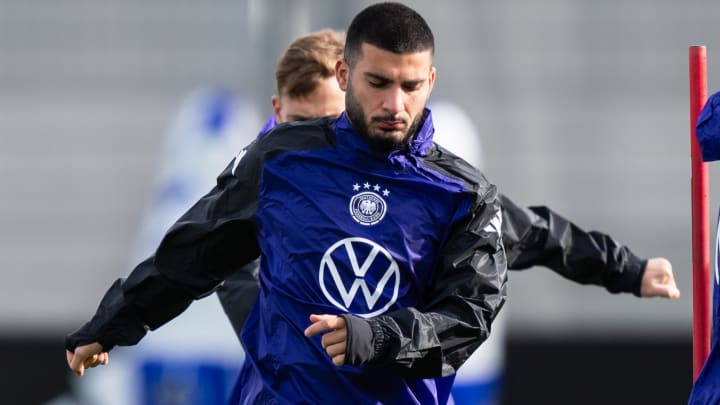
Sané replaces Undav in Germany squad
Deniz Undav will not join up as planned with the Germany squad at the DFB Campus in Frankfurt on Monday due to a hamstring strain. On Sunday ahead of the upcoming UEFA Nations League matches, Nagelsmann called up FC Bayern’s Leroy Sané in his place.
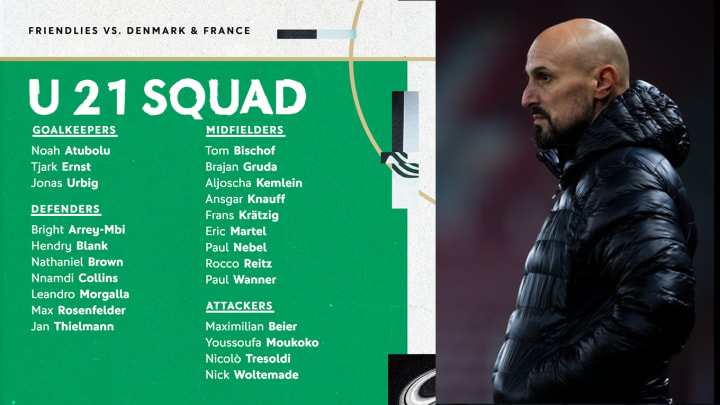
Collins, Bischof and Kemlein receive first U21s call up
Head coach Antonio Di Salvo has named his 23-man squad for the upcoming U21s friendlies against Denmark and France.
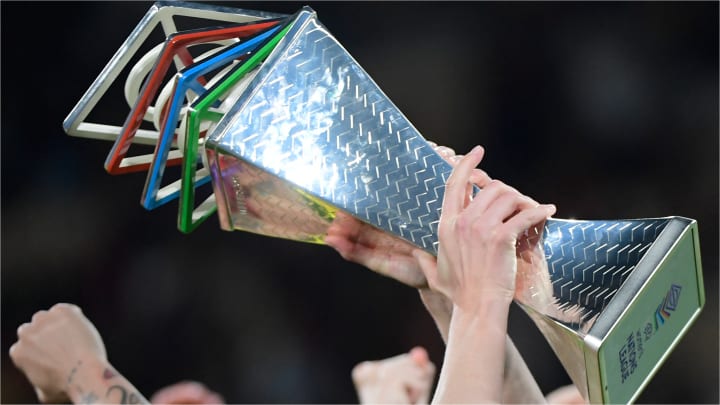
Germany drawn against Netherlands, Austria and Scotland in the Women's Nations League
The Germany women's national team will come up against the Netherlands, Austria and Scotland in Group 1 of League A in the 2025 UEFA Women's Nations League.
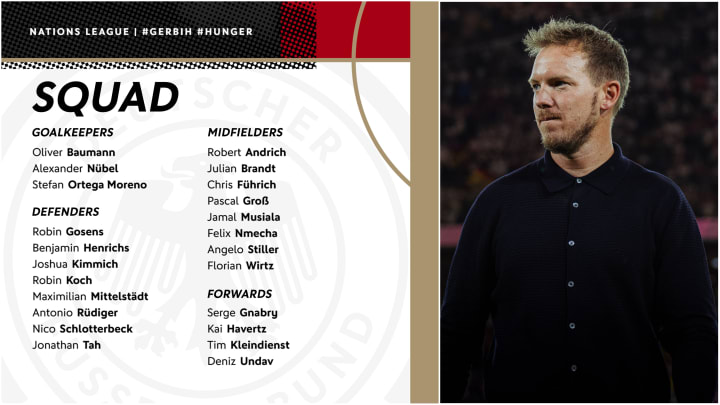
Ortega Morena receives first Germany call-up, Brandt and Nmecha return
Germany head coach Julian Nagelsmann has announced his squad for the final two Nations League group stage matches against Bosnia and Herzegovina and Hungary.
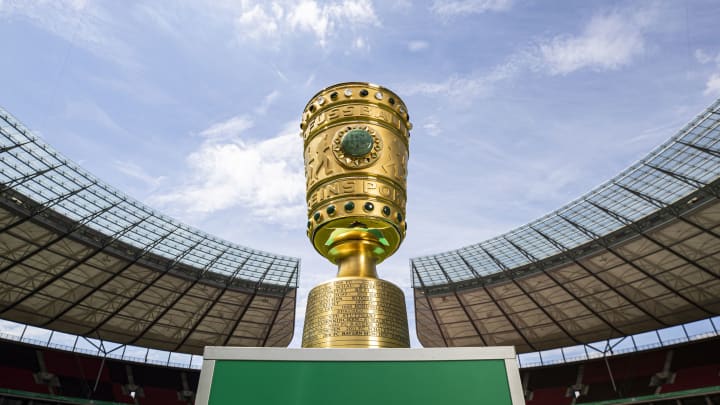
FC Bayern to face Bayer Leverkusen in DFB-Pokal round of 16
16 teams remain in contention to lift the DFB-Pokal this season, with the draw for the next round having been conducted on Sunday, 3rd November.


.jpg%3F1720007147)


























.jpg%3F1653759824)


